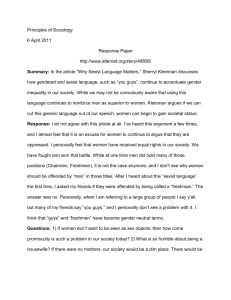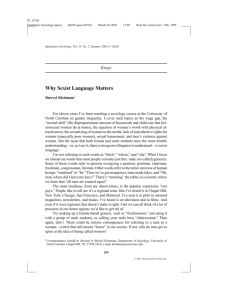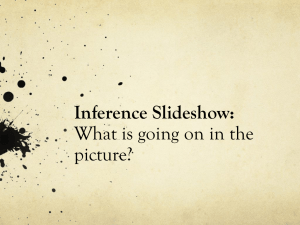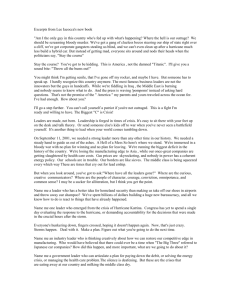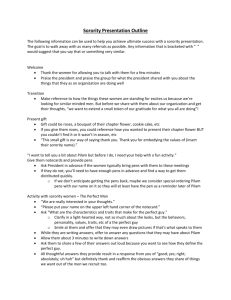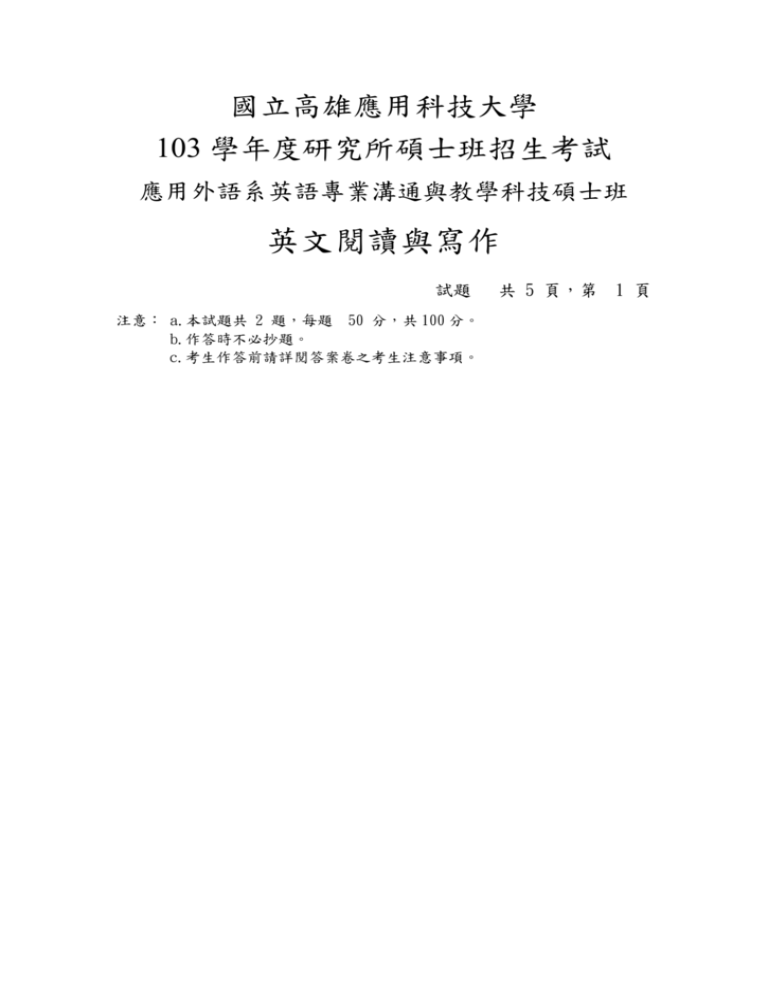
國立高雄應用科技大學
103 學年度研究所碩士班招生考試
應用外語系英語專業溝通與教學科技碩士班
英文閱讀與寫作
試題
注意: a.本試題共 2 題,每題 50 分,共 100 分。
b.作答時不必抄題。
c.考生作答前請詳閱答案卷之考生注意事項。
共 5 頁,第 1 頁
試題
共 5 頁,第
2 頁
1. Write a summary of the following article. (50%)
2. Do you agree with the statement that “working against sexist
language is working against men's violence against women”? Why or why not?
Please argue for your viewpoint. (50%)
Why sexist language matters
Sherryl Kleinman
March 11, 2007, Alert Net
Originally printed in the Center Line, a newsletter of the Orange County Rape Crisis Center
For years I've been teaching a sociology course at the University of North Carolina on
gender inequality. I cover such topics as the wage gap, the "second shift" (of
housework and childcare) that heterosexual women often do in the home, the "third
shift" (women's responsibility for intimate relationships with men), compulsory
heterosexuality, the equation of women's worth with physical attractiveness, the
sexualizing of women in the media, lack of reproductive rights for women (especially
poor women), sexual harassment and men's violence against women.
My course makes links among items on that list. For example, if women are expected
to take care of housework and children, then they cannot compete as equals with men
in the workplace; if men see women largely as sex objects and servers, then it is hard
for men to see women as serious workers outside the home; if women are taught that
it is their job to take care of relationships with men, they may be blamed for breakups;
if women are economically dependent on men, they may stay with abusive male
partners; if women prefer intimacy with women, men may harass or violate them.
What I've left off the list is the issue that both women and men in my classes have the
most trouble understanding -- or, as I see it, share a strong unwillingness to
understand -- sexist language.
I'm not referring to such words as "bitch," "whore" and "slut." What I focus on instead
are words that students consider just fine: male (so-called) generics. Some of these
words refer to persons occupying a position: postman, chairman, freshman,
congressman, fireman. Other words refer to the entire universe of human beings:
試題
共 5 頁,第 3 頁
"mankind" or "he." Then we've got manpower, manmade lakes and "Oh, man, where
did I leave my keys?" There's "manning" the tables in a country where children learn
that "all men are created equal." The most insidious, from my observations, is the
popular expression "you guys." Please don't tell me it's a regional term. I've heard it in
the Triangle, New York, Chicago, San Francisco and Montreal. I've seen it in print in
national magazines, newsletters and books. And even if it were regional, that doesn't
make it right. I'll bet we can all think of a lot of practices in our home regions that
we'd like to get rid of.
I sound defensive. I know. But that's because I've so often heard (and not only from
students) ...What's the big deal? Why does all this "man-ning" and "guys-ing" deserve
a place in my list of items of gender inequality and justify taking up inches of space in
the newsletter of a rape crisis center?
Because male-based generics are another indicator -- and more importantly,
a reinforcer -- of a system in which "man" in the abstract and men in the flesh are
privileged over women. Some say that language merely reflects reality and so we
should ignore our words and work on changing the unequal gender arrangements that
are reflected in our language. Well, yes, in part.
It's no accident that "man" is the anchor in our language and "woman" is not. And of
course we should make social change all over the place. But the words we use can
also reinforce current realities when they are sexist (or racist or heterosexist). Words
are tools of thought. We can use words to maintain the status quo or to think in new
ways -- which in turn creates the possibility of a new reality. It makes a difference if I
think of myself as a "girl" or a "woman"; it makes a difference if we talk about
"Negroes" or "African-Americans." Do we want a truly inclusive language or one that
just pretends?
Before I discuss how benign-sounding words like "freshman" and "you guys"
reinforce the gender inequalities on my list, above, let me tell you about an article that
made a difference in my own understanding of sexist language.
In 1986 Douglas Hofstadter, a philosopher, wrote a parody of sexist language by
making an analogy with race. His article ("A Person Paper on Purity in Language")
試題
共 5 頁,第 4 頁
creates an imaginary world in which generics are based on race rather than gender. In
that world, people would use "fresh white," "chair white" and yes, "you whiteys."
People of color would hear "all whites are created equal" -- and be expected to feel
included. Substituting "white" for "man" makes it easy to see why using "man" for all
human beings is wrong. Yet, women are expected to feel flattered by "freshman,"
"chairman" and "you guys."
And can you think of one, just one, example of a female-based generic? Try using
"freshwoman" with a group of male students or calling your male boss "chairwoman."
Then again, don't. There could be serious consequences for referring to a man as a
"woman" -- a term that still means "lesser" in our society. If not, why do men get so
upset at the idea of being called women?
And why do so many women cling to "freshman," "chairman" and "you guys?" I think
I know why, though it doesn't make me feel any better. "Man" is a high-status term,
and women want to be included in the "better" group. But while being labeled "one of
the guys" might make us feel included, it's only a guise of inclusion, not the reality. If
we were really included, we wouldn't have to disappear into the word "guys."
I'm not saying that people who use "you guys" have bad intentions, but think of the
consequences. All those "man" words -- said many times a day by millions of people
every day -- cumulatively reinforce the message that men are the standard and that
women should be subsumed by the male category. We know from history that making
a group invisible makes it easier for the powerful to do what they want with members
of that group. And we know, from too many past and current studies, that far too
many men are doing "what they want" with women. Most of us can see a link
between calling women "sluts" and "whores" and men's sexual violence against
women. We need to recognize that making women linguistically a subset of man/men
through terms like "mankind" and "guys" also makes women into objects. If we, as
women, aren't worthy of such true generics as "first-year," "chair" or "you all," then
how can we expect to be paid a "man's wage," be respected as people rather than
objects (sexual or otherwise) on the job and at home, be treated as equals rather than
servers or caretakers of others, be considered responsible enough to make our own
decisions about reproduction, define who and what we want as sexual beings? If we
試題
共 5 頁,第 5 頁
aren't even deserving of our place in humanity in language, why should we expect to
be treated as decent human beings otherwise?
Now and then someone tells me that I should work on more important issues -- like
men's violence against women -- rather than on "trivial" issues like language. Well, I
work on lots of issues. But that's not the point. What I want to say (and do say, if I
think they'll give me the time to explain) is that working against sexist
language is working against men's violence against women. It's one step.
If we cringe at "freshwhite" and "you whiteys" and would protest such terms with
loud voices, then why don't we work as hard at changing "freshman" and "you guys?"
Don't women deserve it? If women primarily exist in language as "girls" (children),
"sluts" and "guys," it does not surprise me that we still have a long list of gendered
inequalities to fix. We've got to work on every item on the list. Language is one we
can work on right now, if we're willing. It's easier to start saying "you all" instead of
"you guys" than to change the wage gap tomorrow. Nonsexist English is a resource
we have at the tip of our tongues. Let's start tasting this freedom now.

